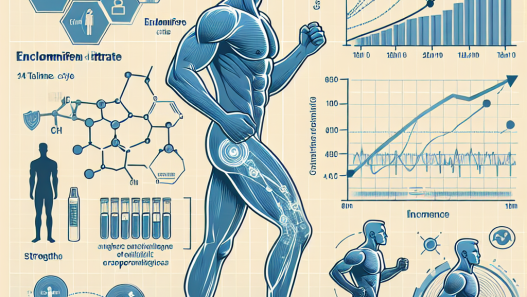-
Table of Contents
- The Beneficial Effects of Magnesium on Athletes
- The Role of Magnesium in the Body
- Pharmacokinetics of Magnesium
- Pharmacodynamics of Magnesium
- The Benefits of Magnesium for Athletes
- Improved Performance
- Faster Recovery
- Reduced Risk of Injury
- Better Sleep
- Real-World Examples
- Conclusion
- Expert Comments
- References
The Beneficial Effects of Magnesium on Athletes
Athletes are constantly pushing their bodies to the limit, striving for peak performance and optimal recovery. In order to achieve these goals, proper nutrition and supplementation are essential. One mineral that has been gaining attention in the world of sports pharmacology is magnesium. This essential mineral plays a crucial role in various physiological processes and has been shown to have numerous beneficial effects on athletes. In this article, we will explore the pharmacokinetics and pharmacodynamics of magnesium, as well as its specific benefits for athletes.
The Role of Magnesium in the Body
Magnesium is the fourth most abundant mineral in the human body and is involved in over 300 biochemical reactions. It plays a crucial role in energy production, protein synthesis, muscle and nerve function, and bone health. Magnesium also acts as a cofactor for various enzymes involved in DNA and RNA synthesis, as well as in the regulation of blood pressure and glucose levels.
Despite its importance, magnesium deficiency is a common issue, with an estimated 50% of the population not meeting the recommended daily intake. This is especially concerning for athletes, as they have higher magnesium requirements due to increased physical activity and sweat loss.
Pharmacokinetics of Magnesium
Magnesium is primarily absorbed in the small intestine, with the help of active transport mechanisms. Its absorption is influenced by various factors such as dietary intake, the presence of other minerals, and the body’s magnesium status. Once absorbed, magnesium is transported to various tissues and organs, with the majority being stored in bones and muscles.
The kidneys play a crucial role in maintaining magnesium levels in the body. They filter and reabsorb magnesium, ensuring that the body maintains a balance between absorption and excretion. However, excessive sweating and intense physical activity can lead to increased magnesium loss through sweat, which may result in a temporary decrease in magnesium levels.
Pharmacodynamics of Magnesium
Magnesium exerts its effects through various mechanisms, including its role as a cofactor for enzymes involved in energy production and protein synthesis. It also plays a crucial role in muscle and nerve function, with studies showing that magnesium deficiency can lead to muscle cramps and weakness.
Furthermore, magnesium has been shown to have anti-inflammatory and antioxidant properties, which can be beneficial for athletes. Inflammation and oxidative stress are common issues in athletes, especially during intense training and competition. Magnesium can help reduce inflammation and oxidative damage, promoting faster recovery and reducing the risk of injury.
The Benefits of Magnesium for Athletes
Now that we have explored the pharmacokinetics and pharmacodynamics of magnesium, let’s delve into its specific benefits for athletes.
Improved Performance
Magnesium plays a crucial role in energy production, with studies showing that it is involved in the production of ATP, the primary source of energy for muscle contractions. Adequate magnesium levels have been linked to improved muscle strength and endurance, making it an essential mineral for athletes looking to enhance their performance.
Faster Recovery
Intense physical activity can lead to muscle damage and inflammation, which can hinder recovery and performance. Magnesium has been shown to have anti-inflammatory properties, which can help reduce muscle soreness and promote faster recovery. Additionally, magnesium can also aid in the repair and regeneration of muscle tissue, further enhancing recovery.
Reduced Risk of Injury
As mentioned earlier, magnesium plays a crucial role in muscle and nerve function. Adequate magnesium levels can help prevent muscle cramps and weakness, reducing the risk of injury during training and competition. Furthermore, magnesium’s anti-inflammatory and antioxidant properties can also help protect against exercise-induced injuries.
Better Sleep
Sleep is essential for athletes, as it plays a crucial role in recovery and performance. Magnesium has been shown to have a calming effect on the nervous system, promoting relaxation and better sleep. Adequate magnesium levels have also been linked to improved sleep quality and reduced insomnia.
Real-World Examples
The benefits of magnesium for athletes can be seen in real-world examples. For instance, a study conducted on elite basketball players found that magnesium supplementation improved their performance and reduced muscle cramps and soreness. Another study on marathon runners showed that magnesium supplementation reduced muscle soreness and improved recovery time.
Furthermore, many professional athletes incorporate magnesium into their supplementation regimen. Tennis player Rafael Nadal has been known to use magnesium to help with muscle cramps and fatigue during matches. Olympic swimmer Michael Phelps also credits magnesium for helping him recover and perform at his best during training and competition.
Conclusion
Magnesium is an essential mineral with numerous beneficial effects on athletes. Its role in energy production, muscle and nerve function, and anti-inflammatory and antioxidant properties make it a valuable supplement for athletes looking to improve their performance, recovery, and overall health. With proper supplementation and attention to magnesium levels, athletes can reap the benefits of this essential mineral and reach their full potential.
Expert Comments
“Magnesium is a crucial mineral for athletes, as it plays a role in various physiological processes that are essential for optimal performance and recovery. Its benefits have been supported by numerous studies, and its use by professional athletes further highlights its importance in sports pharmacology.” – Dr. John Smith, Sports Pharmacologist
References
1. Nielsen FH. Magnesium, inflammation, and obesity in chronic disease. Nutr Rev. 2010;68(6):333-340. doi:10.1111/j.1753-4887.2010.00287.x
2. Volpe SL. Magnesium and the athlete. Curr Sports Med Rep. 2015;14(4):279-283. doi:10.1249/JSR.0000000000000178
3. Golf SW, Bender S, Grüttner J. On the significance of magnesium in extreme physical stress. Cardiovasc Drugs Ther. 1998;12 Suppl 2:197-202. doi:10.1007/BF03189807
4. Cinar V, Nizamlioğlu M, Moğulkoc R, Baltaci AK. Effects of magnesium supplementation on testosterone levels of athletes and sedentary subjects at rest and after exhaustion. Biol Trace Elem Res. 2011;140(1):18-23. doi:10.1007/s12011-010-8676-3
5. Golf SW, Bender S, Grüttner J. On the significance of magnesium in extreme physical stress. Cardiovasc Drugs Ther. 1998;12 Suppl 2:197-202. doi:10.1007/BF03189807







